by Linda Sigrid Hammer (DNV) As the maritime industry moves towards zero-emission operations, ammonia and hydrogen are gradually emerging as suitable ship fuels due to their carbon-free emissions. These new fuels require a change of mindset in terms of design, operations and crew competence, all addressed in a new DNV paper. With no specific IMO regulation available, IMO's alternative design approval (ADA) process is essential for approval, and the paper outlines how DNV rules provide structured, prescriptive requirements to simplify the procedure.
The paper – Safe introduction of alternative fuels: Focus on ammonia and hydrogen as ship fuels – offers a structured pathway for shipowners to achieve approval through IMO’s alternative design approval (ADA) process.
Seven steps to obtain approval for ammonia- and hydrogen-fuelled ships
“We outline seven steps to assist shipowners and other stakeholders in obtaining approval and safely deploying ammonia- and hydrogen-fuelled ships in today’s immature regulatory environment,” says Linda Hammer, Principal Consultant, Environment Advisory at DNV and lead author of the white paper. “The regulatory path is certainly complex, but the steps and safety measures in the paper add up to a clear, achievable pathway to ship approval and safe operations. It also explains how DNV’s support can significantly ease this process through its tailored rule sets and learnings from pilot projects.”
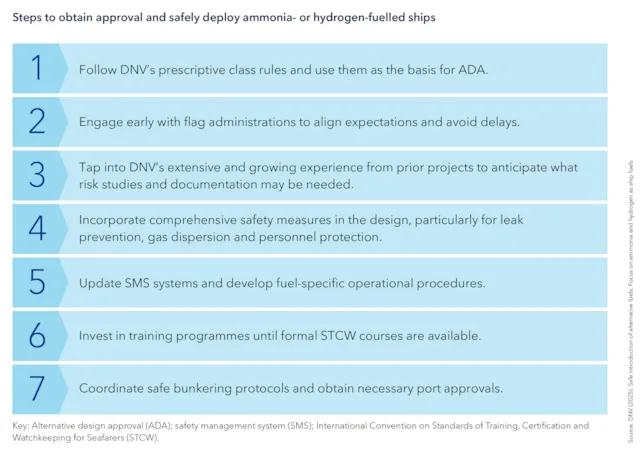
Understanding ADA phases: From initial design to final approval
IMO’s IGF Code (International Code of Safety for Ship Using Gases or Other Low-flashpoint Fuels) currently covers natural gas but not ammonia or hydrogen. Without detailed regulations, IMO’s risk-based ADA process (MSC.1/Circ.1455) is used. It involves demonstrating that the ship’s safety level is equivalent to that of conventional oil-fuelled vessels.

ADA has two main phases. A preliminary design approval requires a hazard identification (HAZID) study, developing a preliminary risk assessment, and defining preliminary risk-control measures and safety strategies.
Phase two, final design approval, starts with refining the design with detailed technical and safety documentation, then making a final risk assessment, addressing integration and operation-specific concerns. Then come complete system integration testing and submitting findings to the flag administration.
Role of class and flag administrations in approval process
As the IMO regulatory framework progresses towards eventually amending the IGF Code, classification societies like DNV can give shipowners a head start in designing vessels by issuing class certificates and providing prescriptive rule frameworks to support ADA.
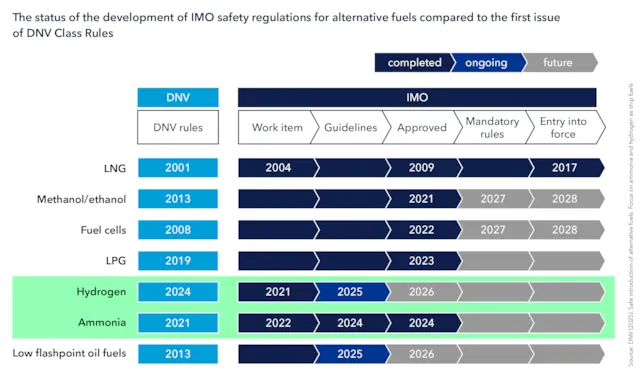
Flag administrations enforce statutory regulations and have the final say on approvals. Early and active engagement with the relevant flag administration is therefore the key to clarifying approval expectations and streamlining ADA.
Subject to flag administration acceptance, the DNV rules can be applied as the flag administration’s approval basis or to significantly reduce the complexity of ADA.
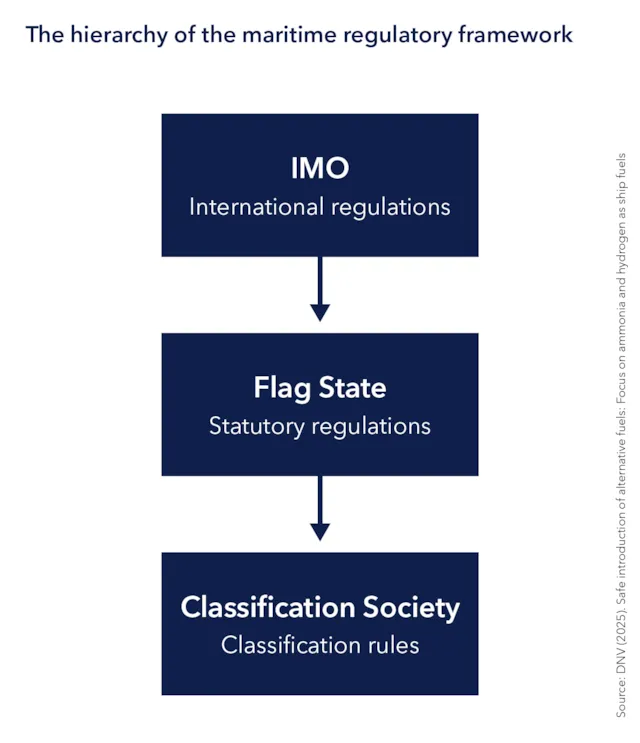
Simplifying ship approval: DNV’s rules for ammonia and hydrogen fuels
DNV’s classification rules for ammonia and hydrogen (i.e. the “Gas fuelled ammonia” notation published in 2021 and the 2024 “Gas fuelled hydrogen” notation) provide structured, prescriptive requirements as far as possible to simplify ADA. Applying them helps reduce uncertainty in flag administration approval, streamlines design focus by aligning with expected risk assessments, and provides predictability to shipowners, ship designers and shipyards.
The paper describes step-by-step actions for obtaining approval. First, engage DNV and the flag administration early to clarify the approval basis. “DNV can help owners and yards in the initial contact with the flag administration to obtain necessary clarification regarding the approval scope and process,” says Hammer.
Second, align the design with DNV rules to ensure it provides a strong technical basis for risk evaluation. Third, tap into DNV’s extensive and growing experience from prior projects to anticipate what risk studies and documentation may be needed.
The paper also discusses measures to manage the new technical, human and organizational risks that both fuels bring compared to conventional fuels. DNV’s dedicated ship rules for each fuel type outline technical requirements and mitigation systems to integrate during design and operation.
Addressing hydrogen safety challenges in design and operations
Hydrogen is highly flammable, with wide explosive limits and low ignition energy.
Hydrogen storage involves cryogenic systems (−253°C) or high-pressure tanks (up to 700 bar).
Safety focus areas include preventing leaks through robust designs and secondary enclosures, ignition prevention, controlled gas dispersion from leakages and personnel protection from frostbite and asphyxiation.
Addressing ammonia safety challenges in ship design
Ammonia is corrosive, toxic to inhale even in small concentrations, and can cause severe tissue damage upon contact.
Safety focus areas discussed in the paper include preventing and detecting leaks, especially near accommodation areas, using ventilation as well as toxic release mitigation strategies, designing safe bunkering systems and containment spaces, and providing personnel protection, including safe havens.
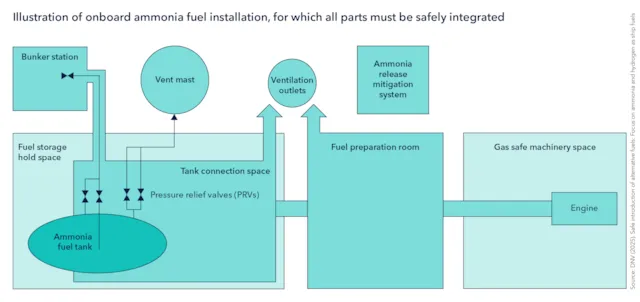
Preparing for safe operations and crew competency
The safety challenges with hydrogen and ammonia also require changes in ship operation, crew training and possibly the organizational set-up.
Safety management system updates must include fuel-specific operating procedures, maintenance protocols and emergency preparedness and drills.
Training and competency development is hampered by the fact that there are currently no courses for ammonia or hydrogen under the STCW (International Convention on Standards of Training, Certification and Watchkeeping for Seafarers).
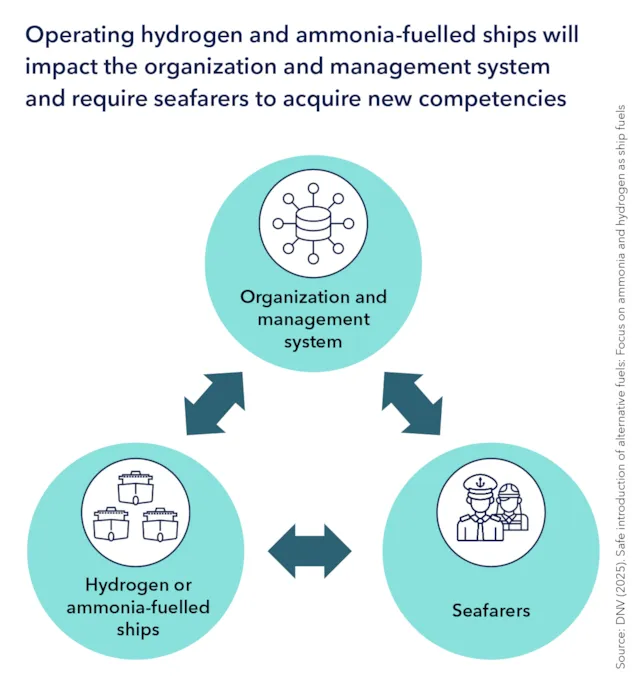
Developing safety training for handling ammonia
The paper recommends that training should be developed in consultation with the flag administration, and that courses should cover fuel properties, normal operation, safety barrier management and emergency response.
DNV Recommended Practice DNV-RP-0699 “Competence related to the use of ammonia as fuel” enables the assessment and verification of individuals’ knowledge and skills to ensure they can operate and maintain systems and equipment safely.
Guidelines from the Maritime Technologies Forum (MTF) on alternative fuel safety management systems can also help in updating the safety management system.
“Organizations must also adapt their safety management systems to ensure continuous oversight of fuel system integrity and safety,” Hammer explains.
Coordinating safe bunkering and port approvals
Safety concerns extend beyond individual ships to the maritime industrial ecosystem within which they operate.
Unlike on-board fuel systems (regulated by the IGF Code), bunkering operations are governed by port, local and national authorities. Each bunkering site requires site-specific risk assessments and dispersion analyses as well as harmonized procedures between ship and shore teams.
The paper suggests adopting harmonized regional practices as developed in studies by the European Maritime Safety Agency (EMSA) and the Maritime Technologies Forum. This could be realized through the development of a network of bunkering locations and green shipping corridors.
Collaborating to accelerate regulatory maturity
Industry-wide collaboration is essential, says Hammer. “As the paper stresses, the maritime industry cannot wait decades to mature these fuel systems as it did with liquefied natural gas. Rapid learning, pilot projects and knowledge sharing are critical.”
DNV supports this through the Nordic Roadmap for Future Fuels, the MarHySafe hydrogen handbook, the Ammonia Safety Handbook published by the Green Shipping Programme and engagements with EMSA to develop hydrogen guidance and training programmes for hydrogen and ammonia. READ MORE
Related articles
Nearly 55,000 articles in our online library!
Use the categories and tags listed below to access the nearly 50,000 articles indexed on this website.
Advanced Biofuels USA Policy Statements and Handouts!
- For Kids: Carbon Cycle Puzzle Page
- Why Ethanol? Why E85?
- Just A Minute 3-5 Minute Educational Videos
- 30/30 Online Presentations
- “Disappearing” Carbon Tax for Non-Renewable Fuels
- What’s the Difference between Biodiesel and Renewable (Green) Diesel? 2020 revision
- How to De-Fossilize Your Fleet: Suggestions for Fleet Managers Working on Sustainability Programs
- New Engine Technologies Could Produce Similar Mileage for All Ethanol Fuel Mixtures
- Action Plan for a Sustainable Advanced Biofuel Economy
- The Interaction of the Clean Air Act, California’s CAA Waiver, Corporate Average Fuel Economy Standards, Renewable Fuel Standards and California’s Low Carbon Fuel Standard
- Latest Data on Fuel Mileage and GHG Benefits of E30
- What Can I Do?
Donate
DonateARCHIVES
- March 2026
- February 2026
- January 2026
- December 2025
- November 2025
- October 2025
- September 2025
- August 2025
- July 2025
- June 2025
- May 2025
- April 2025
- March 2025
- February 2025
- January 2025
- December 2024
- November 2024
- October 2024
- September 2024
- August 2024
- July 2024
- June 2024
- May 2024
- April 2024
- March 2024
- February 2024
- January 2024
- December 2023
- November 2023
- October 2023
- September 2023
- August 2023
- July 2023
- June 2023
- May 2023
- April 2023
- March 2023
- February 2023
- January 2023
- December 2022
- November 2022
- October 2022
- September 2022
- August 2022
- July 2022
- June 2022
- May 2022
- April 2022
- March 2022
- February 2022
- January 2022
- December 2021
- November 2021
- October 2021
- September 2021
- August 2021
- July 2021
- June 2021
- May 2021
- April 2021
- March 2021
- February 2021
- January 2021
- December 2020
- November 2020
- October 2020
- September 2020
- August 2020
- July 2020
- June 2020
- May 2020
- April 2020
- March 2020
- February 2020
- January 2020
- December 2019
- November 2019
- October 2019
- September 2019
- August 2019
- July 2019
- June 2019
- May 2019
- April 2019
- March 2019
- February 2019
- January 2019
- December 2018
- November 2018
- October 2018
- September 2018
- August 2018
- July 2018
- June 2018
- May 2018
- April 2018
- March 2018
- February 2018
- January 2018
- December 2017
- November 2017
- October 2017
- September 2017
- August 2017
- July 2017
- June 2017
- May 2017
- April 2017
- March 2017
- February 2017
- January 2017
- December 2016
- November 2016
- October 2016
- September 2016
- August 2016
- July 2016
- June 2016
- May 2016
- April 2016
- March 2016
- February 2016
- January 2016
- December 2015
- November 2015
- October 2015
- September 2015
- August 2015
- July 2015
- June 2015
- May 2015
- April 2015
- March 2015
- February 2015
- January 2015
- December 2014
- November 2014
- October 2014
- September 2014
- August 2014
- July 2014
- June 2014
- May 2014
- April 2014
- March 2014
- February 2014
- January 2014
- December 2013
- November 2013
- October 2013
- September 2013
- August 2013
- July 2013
- June 2013
- May 2013
- April 2013
- March 2013
- February 2013
- January 2013
- December 2012
- November 2012
- October 2012
- September 2012
- August 2012
- July 2012
- June 2012
- May 2012
- April 2012
- March 2012
- February 2012
- January 2012
- December 2011
- November 2011
- October 2011
- September 2011
- August 2011
- July 2011
- June 2011
- May 2011
- April 2011
- March 2011
- February 2011
- January 2011
- December 2010
- November 2010
- October 2010
- September 2010
- August 2010
- July 2010
- June 2010
- May 2010
- April 2010
- March 2010
- February 2010
- January 2010
- December 2009
- November 2009
- October 2009
- September 2009
- August 2009
- July 2009
- June 2009
- May 2009
- April 2009
- March 2009
- February 2009
- January 2009
- December 2008
- November 2008
- October 2008
- September 2008
- August 2008
- July 2008
- June 2008
- May 2008
- April 2008
- March 2008
- February 2008
- January 2008
- December 2007
- November 2007
- October 2007
- September 2007
- August 2007
- June 2007
- February 2007
- January 2007
- October 2006
- April 2006
- January 2006
- April 2005
- December 2004
- November 2004
- December 1987
CATEGORIES
- About Us
- Advanced Biofuels Call to Action
- Aviation Fuel/Sustainable Aviation Fuel (SAF)
- BioChemicals/Renewable Chemicals
- BioRefineries/Renewable Fuel Production
- Business News/Analysis
- Cooking Fuel
- Education
- 30/30 Online Presentations
- Competitions, Contests
- Earth Day 2021
- Earth Day 2022
- Earth Day 2023
- Earth Day 2024
- Earth Day 2025
- Executive Training
- Featured Study Programs
- Instagram TikTok Short Videos
- Internships
- Just a Minute
- K-12 Activities
- Mechanics training
- Online Courses
- Podcasts
- Scholarships/Fellowships
- Teacher Resources
- Technical Training
- Technician Training
- University/College Programs
- Events
- Coming Events
- Completed Events
- More Coming Events
- Requests for Speakers, Presentations, Posters
- Requests for Speakers, Presentations, Posters Completed
- Webinars/Online
- Webinars/Online Completed; often available on-demand
- Federal Agency/Executive Branch
- Agency for International Development (USAID)
- Agriculture (USDA)
- Commerce Department
- Commodity Futures Trading Commission
- Congressional Budget Office
- Defense (DOD)
- Air Force
- Army
- DARPA (Defense Advance Research Projects Agency)
- Defense Logistics Agency
- Marines
- Navy
- Education Department
- Energy (DOE)
- Environmental Protection Agency
- Federal Energy Regulatory Commission (FERC)
- Federal Reserve System
- Federal Trade Commission
- Food and Drug Administration
- General Services Administration
- Government Accountability Office (GAO)
- Health and Human Services (HHS)
- Homeland Security
- Housing and Urban Development (HUD)
- Interior Department
- International Trade Commission
- Joint Office of Energy and Transportation
- Justice (DOJ)
- Labor Department
- National Academies of Sciences Engineering Medicine
- National Aeronautics and Space Administration
- National Oceanic and Atmospheric Administration
- National Research Council
- National Science Foundation
- National Transportation Safety Board (NTSB)
- Occupational Safety and Health Administration
- Overseas Private Investment Corporation
- Patent and Trademark Office
- Securities and Exchange Commission
- State Department
- Surface Transportation Board
- Transportation (DOT)
- Federal Aviation Administration
- National Highway Traffic Safety Administration (NHTSA)
- Pipeline and Hazardous Materials Safety Admin (PHMSA)
- Treasury Department
- U.S. Trade Representative (USTR)
- White House
- Federal Legislation
- Federal Litigation
- Federal Regulation
- Feedstocks
- Agriculture/Food Processing Residues nonfield crop
- Alcohol/Ethanol/Isobutanol
- Algae/Other Aquatic Organisms/Seaweed
- Atmosphere
- Carbon Dioxide (CO2)
- Field/Orchard/Plantation Crops/Residues
- Forestry/Wood/Residues/Waste
- hydrogen
- Manure
- Methane/Biogas
- methanol/bio-/renewable methanol
- Not Agriculture
- RFNBO (Renewable Fuels of Non-Biological Origin)
- Seawater
- Sugars
- water
- Funding/Financing/Investing
- grants
- Green Jobs
- Green Racing
- Health Concerns/Benefits
- Heating Oil/Fuel
- History of Advanced Biofuels
- Infrastructure
- Aggregation
- Biofuels Engine Design
- Biorefinery/Fuel Production Infrastructure
- Carbon Capture/Storage/Use
- certification
- Deliver Dispense
- Farming/Growing
- Precursors/Biointermediates
- Preprocessing
- Pretreatment
- Terminals Transport Pipelines
- International
- Abu Dhabi
- Afghanistan
- Africa
- Albania
- Algeria
- Angola
- Antarctica
- Arctic
- Argentina
- Armenia
- Aruba
- Asia
- Asia Pacific
- Australia
- Austria
- Azerbaijan
- Bahamas
- Bahrain
- Bangladesh
- Barbados
- Belarus
- Belgium
- Belize
- Benin
- Bermuda
- Bhutan
- Bolivia
- Bosnia and Herzegovina
- Botswana
- Brazil
- Brunei
- Bulgaria
- Burkina Faso
- Burundi
- Cambodia
- Cameroon
- Canada
- Canary Islands
- Caribbean
- Central African Republic
- Central America
- Chad
- Chile
- China
- Colombia
- Congo
- Congo, Democratic Republic of
- Costa Rica
- Croatia
- Cuba
- Cyprus
- Czech Republic
- Denmark
- Dominican Republic
- Dubai
- Ecuador
- Egypt
- El Salvador
- Equatorial Guinea
- Estonia
- Eswatini/Swaziland
- Ethiopia
- European Union (EU)
- Fiji
- Finland
- France
- French Guiana
- Gabon
- Georgia
- Germany
- Ghana
- Global South
- Greece
- Greenland
- Grenada
- Guatemala
- Guinea
- Guyana
- Haiti
- Honduras
- Hong Kong
- Hungary
- Iceland
- India
- Indonesia
- Iran
- Iraq
- Ireland
- Israel
- Italy
- Ivory Coast
- Jamaica
- Japan
- Jersey
- Jordan
- Kazakhstan
- Kenya
- Korea
- Kosovo
- Kuwait
- Laos
- Latin America
- Latvia
- Lebanon
- Liberia
- Lithuania
- Luxembourg
- Macedonia
- Madagascar
- Malawi
- Malaysia
- Maldives
- Mali
- Malta
- Marshall Islands
- Mauritania
- Mauritius
- Mexico
- Middle East
- Moldova
- Monaco
- Mongolia
- Morocco
- Mozambique
- Myanmar/Burma
- Namibia
- Nepal
- Netherlands
- New Guinea
- New Zealand
- Nicaragua
- Niger
- Nigeria
- North Africa
- North America
- North Korea
- Northern Ireland
- Norway
- Oman
- Pakistan
- Panama
- Papua New Guinea
- Paraguay
- Peru
- Philippines
- Poland
- Portugal
- Qatar
- Republic of
- Romania
- Russia
- Rwanda
- Saudi Arabia
- Scotland
- Senegal
- Serbia
- Sierra Leone
- Singapore
- Slovakia/Slovak Republic
- Slovenia
- Solomon Islands
- South Africa
- South America
- South Korea (Republic of Korea)
- South Sudan
- Southeast Asia
- Spain
- Sri Lanka
- Sudan
- Suriname
- Sweden
- Switzerland
- Taiwan
- Tanzania
- Thailand
- Timor-Leste
- Togo
- Trinidad and Tobago
- Tunisia
- Turkey
- Uganda
- UK (United Kingdom)
- Ukraine
- United Arab Emirates UAE
- Uruguay
- Uzbekistan
- Vatican
- Venezuela
- Vietnam
- Wales
- Zambia
- Zanzibar
- Zimbabwe
- Marine/Boat Bio and Renewable Fuel/MGO/MDO/SMF
- Marketing/Market Forces and Sales
- Opinions
- Organizations
- Original Writing, Opinions Advanced Biofuels USA
- Policy
- Presentations
- Biofuels Digest Conferences
- DOE Conferences
- Bioeconomy 2017
- Bioenergy2015
- Biomass2008
- Biomass2009
- Biomass2010
- Biomass2011
- Biomass2012
- Biomass2013
- Biomass2014
- DOE Project Peer Review
- Other Conferences/Events
- R & D Focus
- Carbon Capture/Storage/Use
- Co-Products
- Feedstock
- Logistics
- Performance
- Process
- Vehicle/Engine/Motor/Aircraft/Boiler/Ship
- Yeast
- Railroad/Train/Locomotive Fuel
- Resources
- Books Web Sites etc
- Business
- Definition of Advanced Biofuels
- Find Stuff
- Government Resources
- Scientific Resources
- Technical Resources
- Tools/Decision-Making
- Rocket/Missile Fuel
- Sponsors
- States
- Alabama
- Alaska
- Arizona
- Arkansas
- California
- Colorado
- Connecticut
- Delaware
- Florida
- Georgia
- Hawai'i
- Idaho
- Illinois
- Indiana
- Iowa
- Kansas
- Kentucky
- Louisiana
- Maine
- Maryland
- Massachusetts
- Michigan
- Midwest
- Minnesota
- Mississippi
- Missouri
- Montana
- Native American tribal nation lands
- Nebraska
- Nevada
- New Hampshire
- New Jersey
- New Mexico
- New York
- North Carolina
- North Dakota
- Ohio
- Oklahoma
- Oregon
- Pennsylvania
- Puerto Rico
- Rhode Island
- South Carolina
- South Dakota
- Tennessee
- Texas
- Utah
- Vermont
- Virginia
- Washington
- Washington DC
- West Coast
- West Virginia
- Wisconsin
- Wyoming
- Sustainability
- Uncategorized
- What You Can Do
tags
© 2008-2023 Copyright Advanced BioFuels USA. All Rights reserved.
.jpg)





Comments are closed.